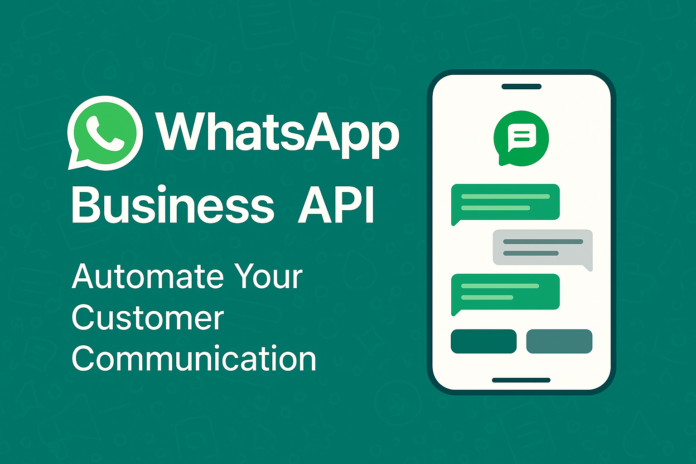In the ever-evolving digital landscape, businesses are constantly searching for more efficient and engaging ways to connect with customers. With over 2 billion active users globally, WhatsApp has become one of the most powerful communication platforms available today. To help businesses tap into this vast user base, Meta introduced two distinct solutions: WhatsApp API and WhatsApp Business .
This article explores both tools in depth — explaining what they are, how they work, their benefits, and how businesses can implement them effectively in 2025.
What is WhatsApp API?
WhatsApp API is a general term used to describe the set of interfaces that allow businesses to integrate WhatsApp’s messaging capabilities into their systems. These APIs enable automated, secure, and scalable communication between businesses and customers.
There are two primary APIs under the WhatsApp umbrella:
- WhatsApp Business (for medium to large businesses)
- WhatsApp Cloud API (hosted by Meta and launched for easier scalability)
The purpose of the API is to go beyond individual communication and offer solutions that are programmable and suitable for bulk messaging, automation, and CRM integration.
What is WhatsApp Business API?
The WhatsApp Business API is designed specifically for medium to large businesses that want to offer customer support, send notifications, and run marketing campaigns on WhatsApp. Unlike the free WhatsApp Business App, which is suited for small businesses, the API is built for scale and automation.
This solution allows businesses to:
- Communicate with thousands of customers simultaneously
- Use automation tools like chatbots
- Integrate with CRM platforms and databases
- Provide multi-agent support using a single business number
It’s important to note that the WhatsApp Business doesn’t come with a user interface. Instead, it needs to be integrated into a backend system or used through a WhatsApp Business Solution Provider (BSP) like Twilio, 360dialog, or MessageBird.
Key Features of WhatsApp API
1. Scalable Messaging
With WhatsApp , businesses can send bulk messages, whether transactional (like delivery updates) or promotional (like special offers).
2. Rich Media Support
Businesses can send messages that include images, videos, documents, buttons, and quick replies, making the conversation more engaging and interactive.
3. Template Messages
You can send pre-approved templates for business-initiated conversations. These templates are ideal for reminders, alerts, OTPs, and more.
4. Real-Time Two-Way Communication
Customers can reply to messages, and businesses can respond within a 24-hour window, maintaining an open and interactive channel.
5. End-to-End Encryption
Security is a top priority, and WhatsApp ensures that all messages sent via the API are fully end-to-end encrypted.
6. Verified Business Profile
A green checkmark next to your business name builds trust and brand authenticity with your customers.
Benefits of Using WhatsApp Business API
✅ Higher Engagement
WhatsApp messages have an average open rate of over 90%, which is significantly higher than email or SMS marketing.
✅ Better Customer Experience
Providing support directly through WhatsApp feels personal and convenient for customers, improving satisfaction and loyalty.
✅ Automation and Chatbots
You can create AI-powered chatbots to handle FAQs, lead qualification, and even sales — reducing the workload on human agents.
✅ Global Reach
With users in over 180 countries, WhatsApp Business is a reliable solution for international customer communication.
✅ Seamless Integrations
Integrate WhatsApp with CRMs, ERPs, marketing tools, and helpdesks for a more connected experience.
WhatsApp Business API vs WhatsApp Business App
Use Cases for WhatsApp Business API
1. Customer Support
Provide instant assistance using chatbots and live agents via a single number.
2. Notifications and Alerts
Send updates on orders, deliveries, payment confirmations, appointments, and more.
3. Marketing Campaigns
Send time-sensitive offers, new product announcements, and loyalty rewards — with consent.
4. Feedback Collection
Gather reviews and ratings easily through conversational forms and surveys.
5. Lead Generation
Capture and qualify leads using interactive forms, quizzes, and automated flows.
How to Get Started with WhatsApp Business API
Step 1: Choose a Business Solution Provider (BSP)
To access WhatsApp , you must register through an official BSP such as Twilio, Gupshup, or 360dialog.
Step 2: Verify Your Facebook Business Account
A verified Meta Business Manager account is mandatory for onboarding.
Step 3: Register Your Phone Number
Use a dedicated number that isn’t already linked to a WhatsApp account.
Step 4: Submit Message Templates
All outbound messages initiated by the business must be pre-approved by Meta.
Step 5: Integrate the API
Connect the WhatsApp API to your CRM, chatbot platform, or backend systems via the BSP’s dashboard or custom development.
WhatsApp API Pricing in 2025
WhatsApp Business API uses a conversation-based pricing model:
- User-Initiated Conversations: When a customer messages first.
- Business-Initiated Conversations: When your business sends the first message using a template.
Meta charges per 24-hour session. BSPs may also charge setup or monthly fees, depending on features offered. Always review the pricing of both Meta and your chosen BSP.
Best Practices for WhatsApp API Implementation
- Get User Consent: Always collect opt-ins before sending messages.
- Use Templates Wisely: Keep them short, helpful, and relevant.
- Monitor Metrics: Track open rates, response times, and customer satisfaction.
- Personalize Messages: Use customer data for a tailored experience.
- Stay Compliant: Follow Meta’s commerce and messaging policies strictly.
Future of WhatsApp Business API
With ongoing advancements, WhatsApp is transforming into a complete commerce and customer experience platform. Upcoming features may include:
- In-app product browsing
- Direct payments
- AI-powered smart replies
- Voice and video support
- Advanced analytics
Businesses that adopt WhatsApp API today are future-proofing their communication strategy and setting themselves up for scalable growth.
Final Thoughts
The WhatsApp API and WhatsApp Business are revolutionizing the way businesses engage with customers in 2025. Whether you’re a growing eCommerce store or an established enterprise, these tools offer powerful, scalable, and secure solutions for real-time communication.
By integrating WhatsApp into your support, marketing, and sales channels, you not only meet your customers where they are — but also build stronger relationships and drive measurable business results.






























